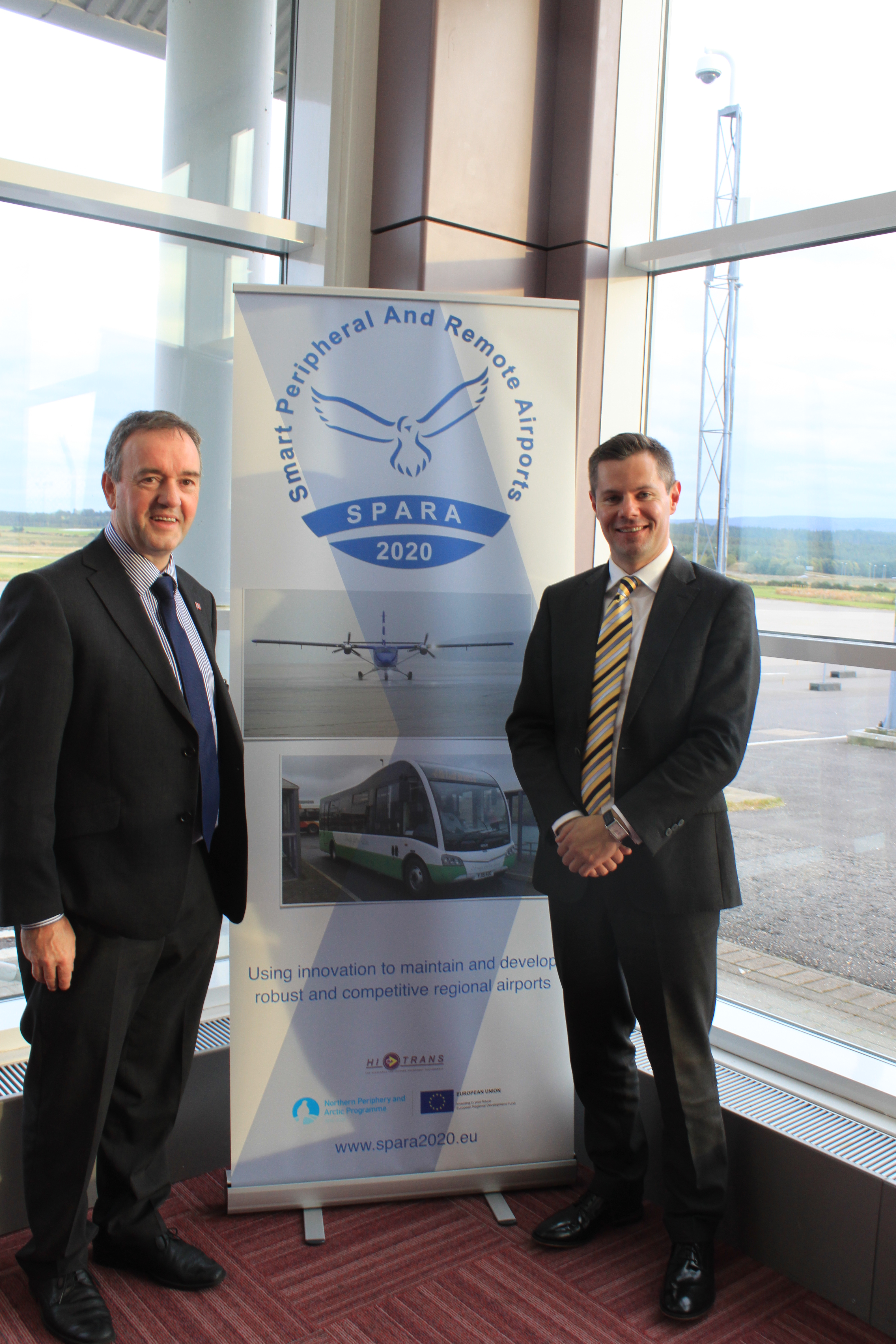10/15/2015 - Minister launches HITRANS rural airports project
HITRANS, the regional transport partnership for the Highlands and Islands, is spearheading a significant European-funded project to assist and develop rural and remote airports with use of new technologies.
SPARA 2020, which stands for Smart Peripheral and Remote Airports, is a three-year €2.4 million Northern Periphery and Arctic Programme area project. It brings together a range of public authorities, academic institutions, airports, small businesses and specialists to focus on the particular challenges of airports serving remote and peripheral areas.
The aim of the project is to heighten awareness of the importance to rural and remote communities of local air services and to use innovative technologies to make them as cost effective and environmentally friendly as possible.
HITRANS, which represents Councils serving the Highlands, Western Isles, Orkney, Moray and Argyll and Bute, is the lead partner. Other Scottish partners include the University of the Highlands and Islands and Robert Gordon University whilst Sweden is represented with Trafikverket (The Swedish Transport Administration), Sundsvall Timrå Airport and Storuman Municipality. The North West Regional Assembly (NWRA) of Ireland will represent airports such as Donegal and Ireland West (Knock) in the project. Molde University in Norway and the University of Sydney is Australia are the other project partners.
SPARA 2020 was launched by Scottish Minister for Transport and the Islands Derek Mackay during a visit this week to Inverness Airport, Dalcross.
He said: “Air services have a vital role to play for remote communities across Scotland so this project, looking at how we can help develop our airports in remote and rural areas, is very welcome. The focus on improving performance and making them more cost effective is incredibly important as we look to continue to provide the best possible service to communities that depend on these transport links.
“The project will also look at how we make remote and rural airports more environmentally friendly, investigating new and innovative measures to reduce their carbon footprint. The Scottish Government continues to do everything we can to support communities in the Highlands and Islands and our recent action to increase the Air Discount Scheme from 40 to 50 per cent underlines that commitment. I wish HITRANS success with the project and look forward to seeing the findings.”
HITRANS Chairman, Councillor James Stockan said: “We are absolutely delighted to be leading on this exciting project and we will be appointing a project officer very soon to drive it forward with our partners. Airports play a hugely important role in the economic wellbeing of our rural and remote communities. They are a lifeline for our residents and vital for our local businesses. This project will hopefully strengthen the role that they play by identifying ways of operating in a more eco-friendly and cost effective way.”
The project will include work on Innovative Technologies to improve airport performance and control cost. This will involve a close examination of Remote Air Traffic and Remote Security technologies as well as distributed training, benefiting from broadband and communication technology advances.
Mindful of aviation’s carbon footprint, two work strands have been developed to foster more sustainable energy use in the sector.
Low carbon fuel airport surface access demonstrator trials are being developed by HITRANS in partnership with their member Councils, Energy Savings Trust and Highlands and Islands Airports (HIAL) at airports in the Highlands and Islands. These are designed to be low carbon exemplar projects on how to decarbonise links from the airport to its local population centres. It is hoped this will include support for electric bus operation, EV car hire and electric/plug-in hybrid taxis roll out to serve airports. The business case for offering biofuels to incoming aircraft at the region’s airports will be examined in some detail learning from some pioneering work at Karlstadt Airport in Sweden.
The project also intends to examine in some detail the distinct socio-cultural role that airports play in the Northern Periphery and Arctic area and also to refine and improve economic impact assessment methodologies of SPARA airports with a view to better guide future public investment. This will include studies led by RGU at airports in Ireland, Scotland and possibly Sweden.

Pictured above are Cllr James Stockan< HITRANS Chair (l) and Derek MacKay MSP, Minister for Transport and Islands (r)
-ends-
Note: The Northern Periphery and Arctic Programme 2014-2020, is funded by the ERDF, and more generally aims to help peripheral and remote communities on the northern margins of Europe to develop their economic, social and environmental potential.